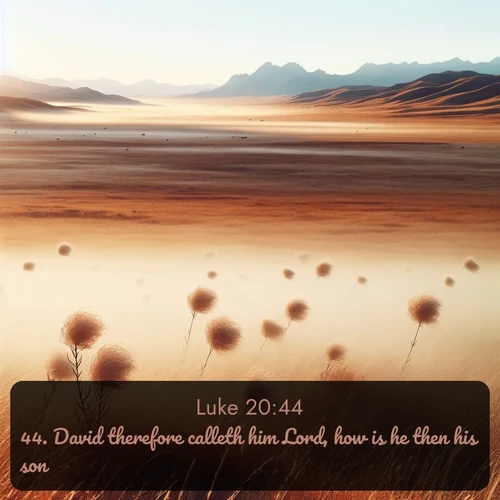Gospel of Luke 20:44 plusieurs versions / traductions
English Bible Translations
44. David then gives him the name of Lord, so how is it possible for him to be his son?
German Bible Translations
French Bible Translations
Versions with Strong Codes
Luke 20 / KJV_Strong44.
Strong Code definitions
G1138 Dabid/dab-eed' of Hebrew origin (1732); Dabid (i.e. David), the Israelite king:-David. see H1732
G3767 oun/oon apparently a primary word; (adverbially) certainly, or (conjunctionally) accordingly:--and (so, truly), but, now (then), so (likewise then), then, therefore, verily, wherefore.
G2564 kaleo/kal-eh'-o akin to the base of G2753; to "call" (properly, aloud, but used in a variety of applications, directly or otherwise):--bid, call (forth), (whose, whose sur-)name (was (called)). see G2753
G846 autos/ow-tos' from the particle au (perhaps akin to the base of G109 through the idea of a baffling wind) (backward); the reflexive pronoun self, used (alone or in the comparative 1438) of the third person , and (with the proper personal pronoun) of the other persons:--her, it(-self), one, the other, (mine) own, said, (self-), the) same, ((him-, my-, thy- )self, (your-)selves, she, that, their(-s), them(-selves), there(-at, - by, -in, -into, of, -on, -with), they, (these) things, this (man), those, together, very, which. Compare 848. see G109 see G1438 see G848
G2962 kurios/koo'-ree-os from kuros (supremacy); supreme in authority, i.e. (as noun) controller; by implication, Master (as a respectful title):-- God, Lord, master, Sir.
G4459 pos/poce adverb from the base of G4226; an interrogative particle of manner; in what way? (sometimes the question is indirect, how?); also as exclamation, how much!:--how, after (by) what manner (means), that. (Occasionally unexpressed in English). see G4226
G2076 esti/es-tee' third person singular present indicative of G1510; he (she or it) is; also (with neuter plural) they are:--are, be(-long), call, X can(not), come, consisteth, X dure for a while, + follow, X have, (that) is (to say), make, meaneth, X must needs, + profit, + remaineth, + wrestle. see G1510
G2532 kai/kahee apparently, a primary particle, having a copulative and sometimes also a cumulative force; and, also, even, so then, too, etc.; often used in connection (or composition) with other particles or small words:--and, also, both, but, even, for, if, or, so, that, then, therefore, when, yet.
G846 autos/ow-tos' from the particle au (perhaps akin to the base of G109 through the idea of a baffling wind) (backward); the reflexive pronoun self, used (alone or in the comparative 1438) of the third person , and (with the proper personal pronoun) of the other persons:--her, it(-self), one, the other, (mine) own, said, (self-), the) same, ((him-, my-, thy- )self, (your-)selves, she, that, their(-s), them(-selves), there(-at, - by, -in, -into, of, -on, -with), they, (these) things, this (man), those, together, very, which. Compare 848. see G109 see G1438 see G848
G5207 huios/hwee-os' apparently a primary word; a "son" (sometimes of animals), used very widely of immediate, remote or figuratively, kinship:--child, foal, son.
Prédications qui analysent les thèmes Évangile selon Luc 20
Thèmes : Parabole des vignerons; Question sur l'impôt; Quand vient le Messie; Le vin nouveau dans les outres nouvellesRelated Sermons discussing Gospel of Luke 20
Themes : Parabole des vignerons; Question sur l'impôt; Quand vient le Messie; Le vin nouveau dans les outres nouvellessee also: Bible Key Verses ; KJV Bible Images, BBE Bible images

